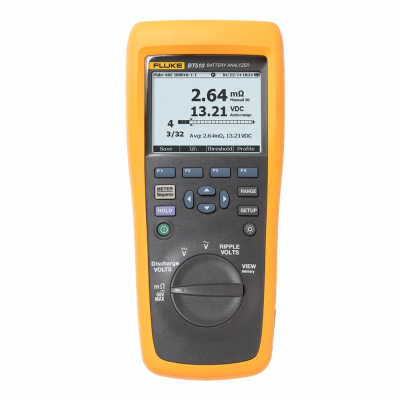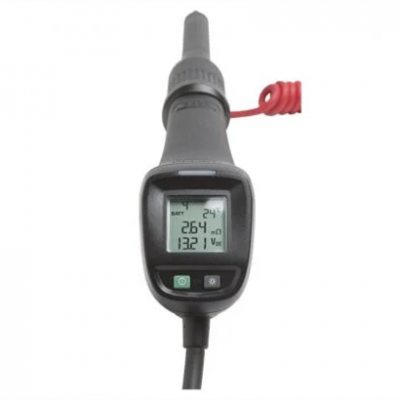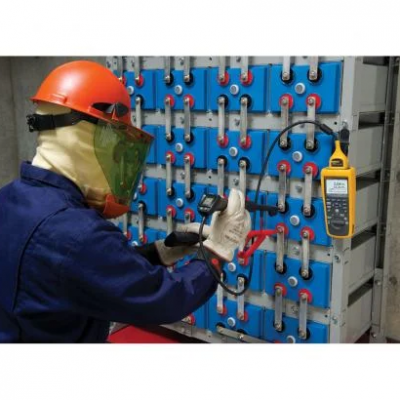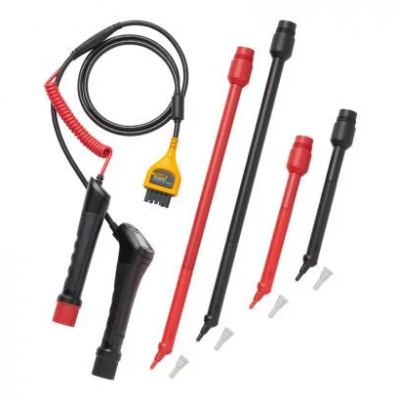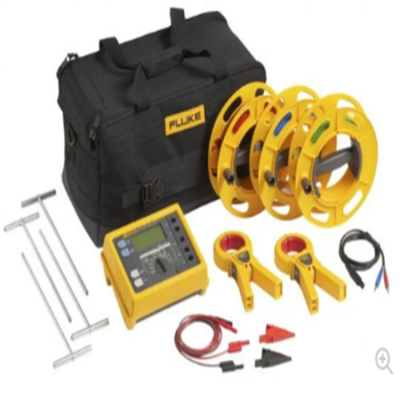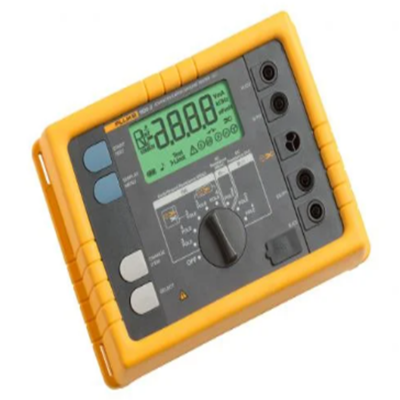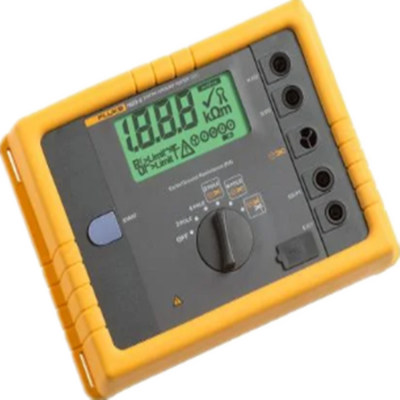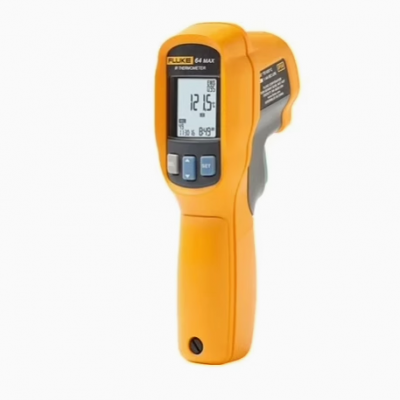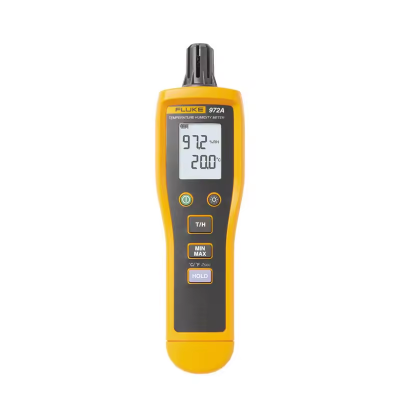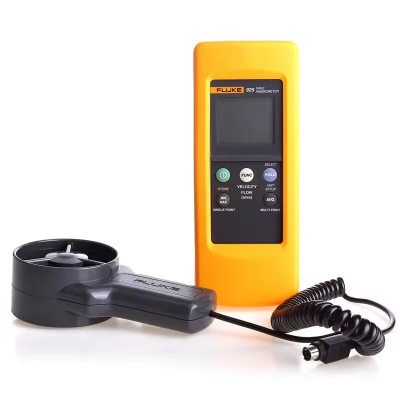| Contact Us For Quotation | Email: 464560351@qq.com | Whatsapp&Wechat:+8618620373879 |
Musktool-Fluke 500 Series Battery Analyzer,BT521,BT510,BT520
Key features
The ideal test tool for maintenance, troubleshooting and performance testing of individual stationary batteries and battery banks used in critical battery back-up applications
|
Product overview: Fluke 500 Series Battery Analyzer
Reduced testing complexity, a simplified workflow and an intuitive user interface provide a new level of ease-of-use in battery testing.
The ideal test tool for maintenance, troubleshooting and performance testing of individual stationary batteries and battery banks used in critical battery back-up applications
The intuitive user interface, compact design and rugged construction ensure optimum performance, test results and reliability
Covers a broad range of battery test functions ranging from DC voltage and resistance tests to full condition testing using automated string function testing and the test probe integrated infra-red temperature measurement system
Designed for measurements on stationary batteries of all types.
Voltage and resistance thresholds
Fluke Battery Analyzers allow you to quickly and easily define upper and lower measurement thresholds or tolerance ranges. During the testing process, measured values are automatically compared to the predefined threshold levels producing a PASS, FAIL or WARN indication after each measurement. A maximum of 10 sets of thresholds can be stored and threshold indications are determined based on the following criterion:
| Voltage | Resistance | |||
| > Voltage Lower | < Voltage Lower | < Reference | > Reference and Reference x (1+Warning %) | > Reference x (1+Fail) |
| Pass | Fail | Pass | Warning | Fail |
Fluke battery management software
Fluke Battery Management Software Easily allows you to quickly and easily import data from the battery analyzer to a PC. The measurement data and battery profile information is stored and archived with the Management Software and can be used compare results, switch results between conductance and resistance readings and perform trend analysis. All measurement data, battery profile and analysis information can be used to easily generate reports.
Quick view saved readings
Profile management
Histogram of a battery string with end user defined threshold
Historical trend data of batteries
Multiple rounds of discharge voltage
Quick Report Generation
Upgrade Fluke Battery Analyzer firmware
Switch measurement results between conductance and resistance readings
Fluke Battery Analyzer mobile app
The BT521 offers wireless communication for data download and remote display while measuring via the dedicated Fluke Battery Analyzer mobile app (note: the Fluke BT521 is not currently Fluke Connect compatible). Using the Fluke Battery Analyze mobile app you can:
Browse profile
Review sequence testing data
E-mail sequence testing data
Fluke BT510 key features:
Battery Voltage – During the internal resistance test, Fluke Battery Analyzers also measure the voltage of the battery under test
Discharge Volts – The Discharge mode collects the voltage of each battery multiple times at a user defined interval during a discharge or load test. Users can calculate the time a battery takes to drop to the cut-off voltage and use this time to determine the capacity loss of the battery
Ripple Voltage Test – Measures unwanted residual ac component of the rectified voltage in dc charging and inverter circuits. Allows users to test ac components in dc charging circuits and find one of the root causes of battery deterioration
Meter and Sequence Modes – The Meter mode is used for a quick test or troubleshooting. In this mode you can save and read the readings in a measurement or time sequence. The Sequence mode is for maintenance tasks with multiple power systems and battery strings. Before a task starts, users can configure a profile for the task for data management and report generation
Threshold and Warning – Users can configure a maximum of 10 sets of thresholds and receive a Pass/ Warning/ Fail indication after each measurement
Intercell Strap Resistance Test and Data Management – Measures the resistance of the intercell connection between batteries in a string.
AutoHold – When AutoHold is turned on, a reading is captured when it remains stable for 1 second. The reading is then released when a new measurement starts
AutoSave – When AutoSave is turned on, measured values are saved to internal memory automatically after an AutoHold reading is captured
Fluke Battery Management Software – Easily import data from the Product to a PC. The measurement data and battery profile information is stored and archived with the Management Software and can be used for comparison and trend analysis. All measurement data, battery profile and analysis information can be used to easily generate reports
Comprehensive logging – All measured values are automatically captured during testing and can be reviewed on the instrument before downloading for on the-go analysis
Optimized user interface – Quick, guided setup ensures you're capturing the right data every time
Battery life – 7.4 V 3000 mAh lithium-ion battery for more than eight hours continuous operation.
USB port – For fast data download to supplied data analysis and report management application software.
Highest safety rating in the industry – CAT III 600 V, 1000 V dc max. rated for safe measurements all around the battery power supply equipment.
Fluke BT520 Key features:
(Designed for measuring batteries in cabinets and hard to reach places)All of the above plus
BTL20 Intelligent Test Probe set, with long and short probe extenders and built-in LCD display and speaker for visual and audio feedback
BTL20ANG Intelligent Test Probe Set, with long and short angled tip probe extenders (no temperature sensor)
Large soft carry case
Fluke BT521 Key features:
(Designed for users who need to incorporate temperature measuring)All of the above* plus
BTL21 Intelligent Test Probes with long and short extenders, built-in LCD display and speaker for visual and audio feedback and integrated infrared temperature sensor for taking temperature measurements on the negative battery post with every test
BTL20ANG Intelligent Test Probe Set, with long and short angled tip probe extenders (no temperature sensor)
Wireless capability works with Fluke Battery Analyze mobile app (Fluke BA Mobile)*
View profile and associated test results from the Battery Analyzer
Send out the profile and test results via Email with (.csv) data format
* BTL20 not included with the Fluke BT-521
* Not currently compatible with Fluke Connect® app
Specifications: Fluke 500 Series Battery Analyzer
| Range | Resolution | Accuracy | BT510 | BT520 | BT520ANG | BT521 | BT521ANG | |
| Battery Resistance / Strap Resistance1 | 3 mΩ | 0.001 mΩ | 1% + 8 | ● | ● | ● | ||
| 1% +68 | ● | ● | ||||||
| 30 mΩ | 0.01 mΩ | 0.8% + 6 | ● | ● | ● | |||
| 0.8%+12 | ● | ● | ||||||
| 300 mΩ | 0.1 mΩ | 0.8% + 6 | ● | ● | ● | ● | ● | |
| 3000 mΩ | 1 mΩ | 0.8% + 6 | ● | ● | ● | ● | ● | |
| VDC | 6 V | 0.001 V | 0.09% + 5 | ● | ● | ● | ● | ● |
| 60 V | 0.01 V | 0.09% + 5 | ● | ● | ● | ● | ● | |
| 600 V | 0.1 V | 0.09% + 5 | ● | ● | ● | ● | ● | |
| 1000 V | 1 V | 0.09% + 5 | ● | ● | ||||
| VAC (45 Hz to 500 Hz with 800 Hz filter) | 600 V | 0.1 V | 2% + 10 | ● | ● | ● | ● | ● |
| Frequency (displayed with VAC and AAC)2 | 500 Hz | 0.1 Hz | 0.5% + 8 | ● | ● | ● | ● | ● |
| AC voltage ripple (20 KHz Max) | 600 mV | 0.1 mV | 3% + 20 | ● | ● | ● | ● | ● |
| 6000 mV | 1 mV | 3% + 10 | ● | ● | ● | ● | ● | |
| ADC/AAC (with accessory Fluke i410) | 400 A | 1 A | 3.5% + 2 | ● | ● | |||
| Temperature | 0°C to 60°C | 1°C | 2°C (4°F) | ● | ● | |||
| Meter mode | 999 records for each measurement position with time stamp | |||||||
| Sequence mode | Up to 100 profiles and 100 profile templates (Each profile stores up to 450 batteries) with time stamp | |||||||
| 1. The measurement is based on AC injection method. The injected source signal is < 100 mA, 1 kHz. 2. Trigger level VAC: 10 mV, AAC: 10 A | ||||||||
| Measurement Modes | BT510 | BT520 | BT521 | |||||
| Resistance (mΩ) | ● | ● | ● | |||||
| Battery voltage | ● | ● | ● | |||||
| Voltage DC | ● | ● | ● | |||||
| Voltage AC and frequency (Hz) | ● | ● | ● | |||||
| Ripple volt | ● | ● | ● | |||||
| Temperature of negative battery post (using BTL21 straight probes) | ● | |||||||
| DC and AC current (and frequency) | ● | |||||||
| DMM mode | ● | ● | ● | |||||
| Sequence mode | ● | ● | ● | |||||
| Discharge measurement mode | ● | ● | ● | |||||
| Automatic measurement save | ● | ● | ● | |||||
| Wireless communication | ● | |||||||
| Memory view | ● | ● | ● | |||||
| General Specifications - Battery Analyzer | ||||||||
| Size (H x W x D) | 22 x 10.3 x 5.8 cm (9 x 4 x 2 in) | |||||||
| Weight | 850 g (1.9 lb) | |||||||
| Screen dimensions | 7.7 x 5.6 cm (3 x 2.2 in) | |||||||
| Interface | USB mini | |||||||
| Warranty | 3 years | |||||||
| General Specifications - BTL20ANG Angled Measurement Probe | ||||||||
| Long angled probe (overall length) | 242.2 cm (95.38 in) | |||||||
| Short angled probe (overall length) | 216.8 cm (85.38 in) | |||||||
| Overall span (coil relaxed) | 10.1 cm (4 in) | |||||||
| Overall maximum span (coil extended) | 109.2 cm (43 in) | |||||||
| BTL20ANG probe tip angle | 20 degrees from horizontal | |||||||
| Environment Specifications | ||||||||
| Operating temperature | 0°C to 40°C | |||||||
| Storage temperature | -20°C to 50°C | |||||||
| Lithium-ion battery charging temperature | 0°C to 40°C | |||||||
| Operating humidity | Non-condensing (10°C) | |||||||
| ≤ 80% RH (at 10°C to 30°C) | ||||||||
| ≤ 75% RH (at 30°C to 40°C) | ||||||||
| Operating altitude | Sea level to 2000 meters | |||||||
| Storage altitude | Sea level to 12,000 meters | |||||||
| IP rating | IP40 | |||||||
| Radio | FCC Class A | |||||||
| Vibration requirements | MIL-PRF-28800F: Class 2 | |||||||
| Drop test requirements | 1 meter | |||||||
| Temperature coefficients | Add 0.1 x specified accuracy for each degree C above 28°C or below 18°C | |||||||
| Safety compliance | 600 V CAT III | |||||||
| EMC | IEC 61326 | |||||||
| ROHS | China, Europe | |||||||
| Protection class 2 | Pollution Degree II | |||||||
| Battery compliance | UN38.3 | |||||||
| UL2054 | ||||||||
| IEC62133 | ||||||||
| 2 G per IEC68-2-26, 25 G, and 29 | ||||||||














































































































































 English
English
